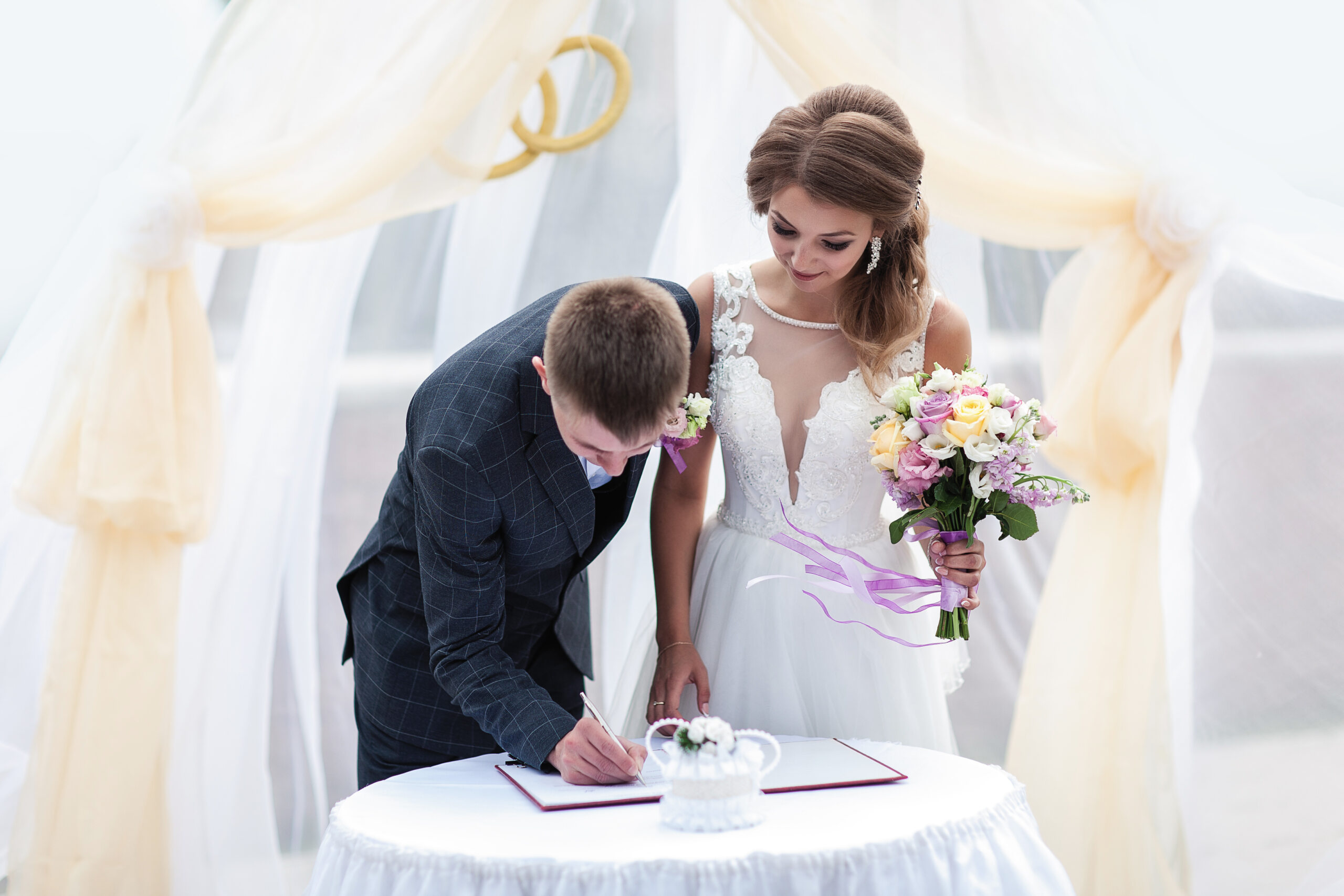When you’re caught up in the excitement of wedding planning, it may be easy to overlook a very important document that you’ll need to have on the big day: your marriage license.
This license is a key part of the process to become legally married. You’ll pick up your marriage license before your wedding day, and then it needs to be signed and returned after the ceremony so that you can get your marriage certificate. The certificate serves as official proof that you’re a married couple.
Because state marriage license applications are issued by city or county, the exact process and documents required can vary. But we’ve put together a guide to what you can generally expect, as well as the answers to frequently asked questions about marriage licenses:
What Is a Marriage License?
A marriage license is the document that authorizes you and your partner to get married. You should apply for your marriage license in advance of the big day. After your ceremony, the marriage license is typically signed by your officiant and one or two witnesses and returned to the city or county clerk’s office. Then, you’ll receive a marriage certificate, which shows that your union is officially recognized by law.
You can think of the marriage license as your marriage application. Like other types of forms, it needs to be filled out, signed, and processed for you to become legally married.
Marriage license vs. certificate
Obtaining a marriage license is the first step in the process of becoming legally married. You apply for a marriage license before your wedding day. The marriage certificate, on the other hand, is a document you’ll get once your marriage license has been completed, returned to the city or county clerk’s office by your officiant, and recorded.
Without a marriage license, you can’t get a marriage certificate. And proof of marriage is likely needed to make changes to your name, share insurance benefits with your partner, and more.
How To Get a Marriage License
- Figure out the details of your wedding.
- Find your city or county clerk’s office.
- Hand over the license fee and required documents.
- Decide if you’ll be changing your name.
- Get your marriage license signed after the ceremony.
- Make sure the completed license is returned sucessfully.
- Request a copy of your marriage certificate.
When you start to plan your wedding, it’s a good idea to keep the marriage license in mind so that you can prepare accordingly. You should factor in enough time to apply for and receive the license — but not too much, otherwise the document may expire before your wedding day.
Here’s a step-by-step guide to getting a marriage license:
- Figure out the details of your wedding. Because marriage licenses are issued by the city or county clerk’s office and usually have an expiration date, you’ll need to know where and when you’re getting married. The license must also be signed by an officiant and up to two witnesses, depending on the state, so you should make sure all required parties are present at the ceremony.
- Find your city or county clerk’s office. Marriage license applications can differ across cities and counties, so you should get familiar with the specific requirements in the area where you’re getting married. In particular, pay attention to the expiration date of your marriage license.
- Hand over the license fee and required documents. While the necessary documents and fee amounts will vary depending on your location, we’ve compiled a list of general requirements for getting a marriage license below.
- Decide if you’ll be changing your name. If you or your partner are making any name changes, your marriage license may be a good opportunity to do it without paying additional fees. Some places allow you to list your new name on the marriage license. However, others won’t let you use a name that differs from your ID, so check with your city or county clerk’s office.
- Get your marriage license signed after the ceremony. This will typically require signatures from you, your partner, the officiant, and your witnesses. You can ask members of the wedding party, family members, or other adults in attendance to serve as witnesses.
- Make sure the completed license is returned successfully. While it’s customary for the officiant to return your marriage license to the city or county clerk’s office, the important thing is that it gets there on time. In California, for example, you need to return the license to your county clerk’s office within 10 days of the ceremony. Depending on the area, you may be able to check online if your marriage certificate has been processed.
- Request a copy of your marriage certificate. Once the city or county clerk’s office has processed your marriage certificate, you’re legally married. However, they might not automatically send you a physical copy of the certificate, so you’ll have to request it on your own (and pay the required fees).
Frequently Asked Questions
If you’re looking for more details about the marriage license application process, here are the answers to common questions you may have.
How much is a marriage license?
The cost of your marriage license will depend on where you live. For example, the fee is $30 in El Paso County, Colorado; $86 in Duval County, Florida, with a $25 discount available for people who complete a premarital preparation course; and $91 in Los Angeles County.
To find out how much a marriage license costs in your state, check out our courthouse weddings article.
Can you get a marriage license online?
Many counties will allow you to start your marriage license application online, but the full process cannot be completed virtually.
“Marriage license applications can be filled out and saved online. However, applicants must appear in person to sign and purchase the marriage license,” says Jennifer Hines, a wedding planning consultant at Top10WeddingVendors.com, a national vendor guide for brides.
How long does it take to get a marriage license?
Don’t procrastinate on getting your marriage license until the day before your wedding, because there may be a mandatory waiting period before you can get married. While the exact waiting period will vary by state, you won’t want to chance it. For example, in Florida, couples must wait three days after their marriage license is issued before they can hold a ceremony.
While you shouldn’t delay in applying for your marriage license, you also don’t want to obtain it too far in advance. With some exceptions, marriage licenses typically expire after a certain period of time, ranging from 10 days in Oklahoma to one year in Arizona.
Can you get married without a marriage license?
You can hold a religious or civil ceremony for family and friends, but you won’t be legally married until the city or county clerk’s office has received your completed marriage license and processed your marriage certificate.
“All couples must apply for and receive a marriage license in order to be legally married,” Hines says.
Where do you get a marriage license?
You can obtain a marriage license application at the city or county clerk’s office wherever you’re planning to get married. You don’t need to be a state resident in order to get a marriage license.
How do I get a copy of my marriage license?
In some states, you’ll get your marriage license immediately after applying at the city or county clerk’s office. In other states, you’ll receive your marriage license in the mail following your in-person appearance.
If you want a physical copy of your marriage certificate, you may need to make a separate request after the wedding and pay a fee.
What do you need to get a marriage license?
Most states will require the following before issuing a marriage license to you:
- Valid identification: A passport, driver’s license, or some other form of government-issued ID will usually suffice, but some counties also require your birth certificate. At the bare minimum, the ID should state your full legal name and date of birth.
- Signatures: After your wedding ceremony, the officiant and up to two witnesses need to sign your marriage license. Some states don’t require witnesses, so make sure to check with your city or county clerk’s office.
- License fee payment: Check with your city or county clerk’s office on which forms of payment it accepts. Don’t assume the office will take Venmo payments!
- In-person appearance: Generally, both you and your partner must show up at the city or county clerk’s office to apply for a marriage license.
You don’t need to present proof of citizenship to get a marriage license, but you’ll need to bring that government-issued ID.
The Bottom Line
If the ceremony is the experience of tying the knot, then your marriage license is the key to getting your union recognized by law. Even though it’s just a piece of paper, your marriage license is a pretty big deal! There’s something special about seeing both of your names signed on the dotted line. By familiarizing yourself with the local requirements in advance, you can time your application and gather the necessary documentation beforehand so that the process goes without a hitch.



